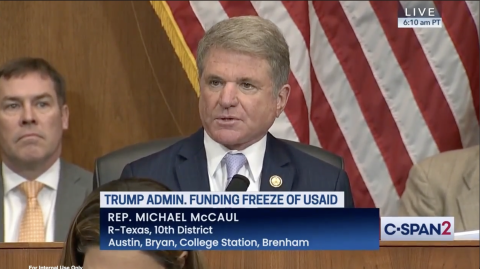Chairman Emeritus McCaul Discusses the Need to Restore USAID to Its Core Mission at House Foreign Affairs Committee Hearing
WASHINGTON – Today, U.S. Congressman Michael McCaul (R-Texas) — chairman emeritus of the House Foreign Affairs Committee — provided remarks at the committee's hearing examining USAID’s misuse of taxpayer dollars under the Biden administration. McCaul highlighted several “woke” programs he uncovered and worked to stop during his time as committee chairman, and he questioned former Representative Ted Yoho (R-Fla.) on the agency’s core mission and national security importance.

Full exchange below:
McCaul: When I was chairman of this committee, I got congressional notifications of the spending from USAID and the State Department and I put holds on those programs — many listed by the chairman. Instead of working with me… the prior Biden administration decided to blow through those holds, bucking a longstanding tradition and I want to go through some of those [programs] I put on hold.
1.5 million [dollars] to promote LGBTQ causes for immigrants in Latin America, allowing them to litigate against foreign governments — primarily Catholic nations. I don't know how that advances the U.S.’ interests abroad. As a Catholic myself, I find that very offensive. We've also heard about the 15 million [dollars] for condoms and contraceptives to Afghanistan — a country under Sharia law — $15 million. What did USAID do? They blew through my holds in complete and utter disregard of this committee's oversight responsibilities.
I also uncovered the department had spent $500,000 to advance atheism in Nepal, in a country where Tibetan [Buddhism] is the predominant religion. What does that have to do advancing U.S. interests abroad? The Humanist International group that they gave money to — the $500,000 — the CEO called the Catholic church “an institution you should ashamed to be involved with.” Our taxpayer dollars to condemn the Catholic church. Again, as a Catholic, I find that extremely offensive. And then the one we've heard so much about, $20,000 for drag shows and drag workshops in Ecuador? Mr. Chairman, I have seen the video you sent out. It is utterly disgusting to the American taxpayer, that we are funding that kind of behavior.
All of these programs gave USAID a black eye, and that's unfortunate because [when] you go back to the Marshall plan — really, the genesis for thinking about USAID — the Marshall plan was one of the most successful programs we endeavored in after World War II to make sure a Hitler never rose from the ashes again. The Food for Peace program, sir, that you discussed, the American farmer benefits from this, and it's been extremely successful.
Why was USAID created in the first place in 1961? It was to counter the Soviet Union during the Cold War. I believe it still has a legitimate purpose to counter the rising threat of China and Belt and Road and our other foreign adversaries. It also has the ability to counter terrorism. Lindsey Graham and I passed the Global Fragility Act, [which led to] State, DoD, and USAID all working together to stabilize destabilized nations, which breed terrorism.
PEPFAR [is] one of the most successful global health programs ever developed under President Bush, yet all of this is called into question because of the irresponsibility of the Biden administration's woke agenda and policies.
Mr. Yoho, we've been friends, we've worked together [as] colleagues. Your greatest legacy is the Build Act, and we need to reinforce that policy as well. But when you look at the core mission, all of these programs need to go — and they will be gone — but as we look at program by program and strip down to the core mission, do you still believe this is a worthwhile endeavor, the core mission of USAID?
Yoho: I do. I think what you see over a period of time is a mission creep. You know, these programs were designed with purity of purpose. This is what they're supposed to do, and when you get mission creep you get these things that we're seeing and they're indefensible — some of the programs that you guys mentioned — and that loses trust, like you said. And in business, what I've learned — and I think everybody can agree with this — people like to do business with people they know, they like, and they trust. If that's true when it's on a business setting, it's the same in nations. If other nations know us, they like us and they trust us, they're going to do business with us, and we've heard this over and over again, and it's been brought up by other leaders …
McCaul: Can I ask, is it in our national security interest to maintain the core mission — I would argue under the State Department for proper supervision?
Yoho: Yes, it is. If we don't do that, we cede that leadership to other people.
###